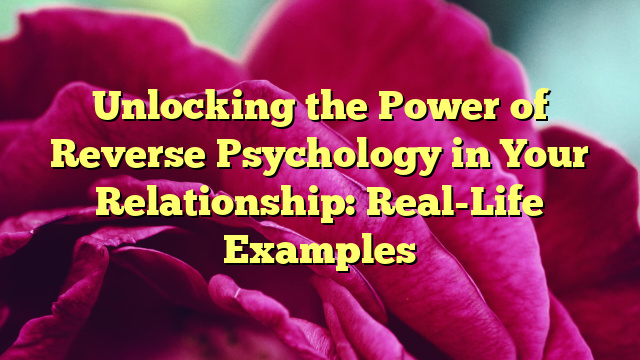Unlocking the Power of Reverse Psychology in Your Relationship: Real-Life Examples
Unlocking the Power of Reverse Psychology in Your Relationship: Real-Life Examples
Introduction
Reverse psychology is a powerful tool that can be used to influence and manipulate others, especially in a relationship. By understanding how reverse psychology works and using it effectively, you can create positive changes and strengthen your bond with your partner. In this article, we will explore the concept of reverse psychology and provide real-life examples of how it can be applied in relationships.
Understanding Reverse Psychology
Reverse psychology is a technique that involves getting someone to do what you want by suggesting the opposite of what you desire. It works by triggering a person’s natural resistance to being controlled or manipulated. When someone feels like they are being told what to do, they often rebel or resist. However, when reverse psychology is used, the person feels like they are making their own decision, even though it aligns with what you wanted in the first place.
For example, let’s say you want your partner to spend more quality time with you. Instead of directly asking them to do so, you could say something like, “I don’t think we have enough time to spend together. We’re both so busy with our own things.” This statement triggers their desire to prove you wrong and show that they can make time for you. As a result, they are more likely to initiate spending quality time with you.
Real-Life Examples
Now, let’s explore some real-life examples of how reverse psychology can be applied in relationships:
Example 1: Encouraging Communication
Communication is vital in any relationship, but sometimes one partner may be hesitant to open up or express their feelings. Instead of pressuring them to talk, you can use reverse psychology to create a safe space for communication.
For instance, you could say, “I understand if you don’t want to talk about it. It’s okay to keep things to yourself.” By giving them permission to keep things to themselves, you are indirectly encouraging them to share their thoughts and feelings. They may feel more comfortable opening up because they don’t feel forced or obligated to do so.
Example 2: Encouraging Acts of Affection
Physical affection is an important aspect of a romantic relationship. If you feel like your partner is not showing enough affection, you can use reverse psychology to encourage them to do so.
Instead of complaining or demanding more affection, you could say, “I understand if you’re not the type to show affection openly. It’s okay, I can live without it.” This statement triggers their desire to prove you wrong and show that they are capable of being affectionate. They may start initiating acts of affection to demonstrate that they can be loving and caring.
Example 3: Encouraging Personal Growth
Personal growth is essential for both individuals in a relationship. If you feel like your partner is stuck in a rut or not pursuing their goals, you can use reverse psychology to encourage them to take action.
Instead of pushing them to change or improve, you could say, “I love you just the way you are. You don’t need to change anything.” This statement triggers their desire to prove you wrong and show that they are capable of personal growth. They may start taking steps towards their goals or making positive changes in their life.
Using Reverse Psychology Wisely
While reverse psychology can be a powerful tool, it is important to use it wisely and ethically in your relationship. Here are some guidelines to keep in mind:
- Be genuine: Make sure your intentions are sincere and that you genuinely want what is best for your partner.
- Don’t overuse it: Reverse psychology should be used sparingly and strategically. Overusing it can lead to manipulation and damage trust in the relationship.
- Respect boundaries: Be mindful of your partner’s boundaries and don’t use reverse psychology to push them into something they are uncomfortable with.
- Communicate openly: While reverse psychology can be effective, open and honest communication is still essential for a healthy relationship. Use reverse psychology as a supplement, not a replacement, for communication.
Conclusion
Reverse psychology can be a powerful tool in your relationship when used effectively and ethically. By understanding how it works and applying it in real-life situations, you can create positive changes and strengthen your bond with your partner. Remember to use reverse psychology wisely, respecting boundaries and maintaining open communication. Unlock the power of reverse psychology and watch your relationship thrive.

